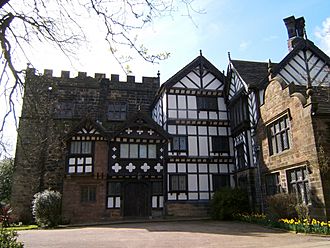Turton Tower facts for kids
Quick facts for kids Turton Tower |
|
|---|---|
 |
|
| General information | |
| Type | Manor house |
| Location | Chapeltown, Blackburn with Darwen, Lancashire |
| Country | England |
| Coordinates | 53°37′59″N 2°24′27″W / 53.6330°N 2.4075°W |
| Construction started | Early 15th century |
| Completed | 1596 |
| Owner | Blackburn with Darwen Council |
|
Listed Building – Grade I
|
|
| Designated: | 27 January 1967 |
| Reference #: | 1241557 |
Turton Tower is an amazing old manor house located in Chapeltown, England. It's a very important historical site, officially known as a scheduled ancient monument and a Grade I listed building. This means it's protected because of its special history and architecture.
The tower started as a strong stone building called a pele tower in the early 1400s. It was built to protect people from attacks. Over time, it was changed and made much bigger, especially in the late 1500s. Turton Tower sits high up on a hill, about 600 feet above sea level, not far from Bolton. An old writer named William Camden once said it was built in a wild, rocky area. More parts were added when Queen Elizabeth I was on the throne, and further changes were made when Queen Victoria became queen.
Contents
The Tower's Design and Changes
The oldest part of Turton Tower is the stone pele tower, likely built in the early 1400s. This part is about 45 feet long and 28 feet wide. Its walls are very thick, about 4 feet! The tower was originally about 35 feet tall and had three low floors. You can still see where old windows were blocked up.
How the Tower Grew Over Time
In the early 1500s, two buildings with special curved wooden frames, called cruck frames, were added to the tower. Later, an extension at the front created the main entrance with its impressive front door. Inside, you can still see parts of these old wooden frames and walls made with wattle and daub (a mix of sticks and mud) and lath and plaster (thin strips of wood covered in plaster).
Big changes happened in 1596. The tower was made taller, reaching its current height. The new top floor was built with smooth, cut stone, different from the rougher stone below. The old floors were removed, and the walls were raised to 45 feet, all the way to the top of the battlements (the protective walls with gaps). The narrow old windows were blocked up and replaced with much larger windows that had stone dividers, called mullions and transoms. This completely changed how the old part of the building looked.
Later Updates and Styles
During the 1600s, the cruck-framed buildings were covered in stone. The tower stayed mostly the same until the 1800s. The Chetham family made small changes in the 1700s and early 1800s. After 1835, the Kay family took over and made many Victorian-style updates. This included adding a Dutch gable (a decorative roof shape) to the front. Other rooms, like the Ashworth and Bradshaw rooms, were also changed during this time.
Who Lived at Turton Tower?
Turton Tower was once the home of the lords who owned the land of Turton. Around 1200, the manor was part of a larger area controlled by Manchester. By 1420, the Orrell family owned the tower, and they were the ones who rebuilt the pele tower.
In 1603, William Camden wrote that the tower was first built for defense. He also mentioned that exciting tournaments were held there in the 1300s, and that the tower was completely rebuilt with stone in 1594.
Famous Owners and Public Use
In 1628, the Orrells sold Turton Tower to Humphrey Chetham. He was a wealthy merchant from Manchester who later created the famous Chetham's Library and Chetham's School of Music. The tower then passed down through his family, including the Bland, Green, and Frere families. They rented it out to farmers for many years.
In 1835, the tower was in bad shape when James Kay bought it. He worked to restore it to its former glory. Later, he sold it to Elizabeth and Anne Appleton, who rented it to William Rigg. His daughter, Ellen, wrote a book called "Victorian Children at Turton Tower," which tells us about life there long ago.
In 1903, Sir Lees Knowles, 1st Baronet, a Member of Parliament, bought the tower. After he passed away in 1929, his wife, Lady Nina Knowles, gave it to the local council in 1930. Turton Tower then became the council's main office.
After some changes to local government in 1974, Turton Tower became part of the new Borough of Blackburn. Today, it is managed by Blackburn with Darwen Council and is a wonderful place for people to visit and learn about history.
Gallery
See also
- Listed buildings in North Turton
 | Madam C. J. Walker |
 | Janet Emerson Bashen |
 | Annie Turnbo Malone |
 | Maggie L. Walker |






